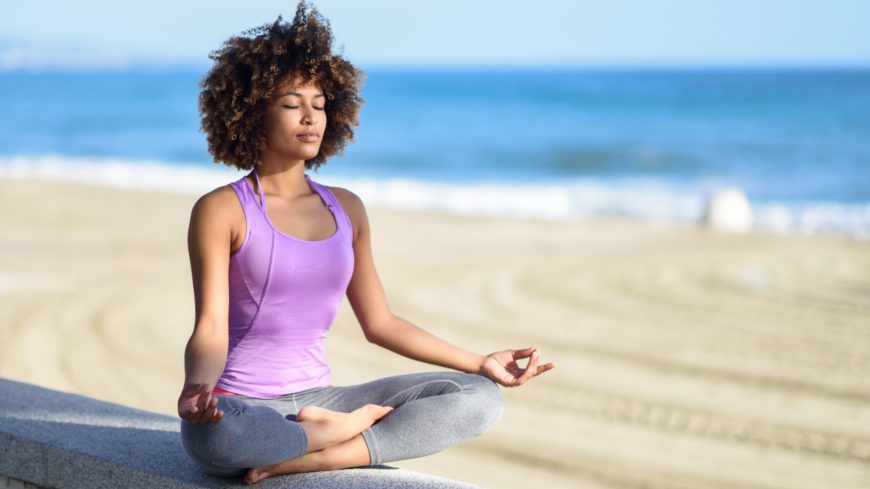Chronic inflammation and pain, stressful situations, a wide range of anxiety disorders can naturally affect both our mental and physical state. Although there are traditional treatment plans that can help with these conditions, there is another thing that can help you even more – meditation.

Now, a lot of people doubt the power of meditation and a lot of them have the wrong conception about what it is. Sure, there are specific forms that are done in groups and that do not have specific uses, however, there are also types that can help you deal with chronic conditions, as well as negative emotions.
The article below will help you with several things. First, we will take a look at what this session is, we will explain how it can help with different conditions, and of course, what meditation types you should try. Let’s take a closer look at the article that will bring the concept of mindfulness closer to you.
Meditation: Briefly Explained

The first thing you should know is that this practice is basically ancient, and it originated from a wide range of Eastern, Native American, and Aboriginal cultures. Traditional medicine does focus on the needs of our bodies – both physical and emotional – however, besides our physical and emotional needs, meditation also focuses on the energy that runs through our body.
You might be wondering – but why is that energy important? Well, to put it simply, if your energy is not balanced, that is what might cause mental and physical problems that people often struggle with. It can easily help you with rebalancing that energy, as well as improving your overall health.
This ancient technique is all about being present, as well as on focusing on boosting the positive energy (also known as high vibrations) and decreasing the negative energy (also known as low vibrations). Some people opt for practicing mindfulness if they are feeling anxious or stressed, and if they are dealing with chronic pain or inflammation.
The Different Session Types

Naturally, there are various meditation types that you can try, however, the most common ones that are usually recommended include:
- Active Session – this a type that you might already be practicing. It includes “getting in the zone” when exercising – such as running or walking – and it requires people to focus only on their breathing, heartbeat, and the movements that your body makes. When you get in the zone and when you are filling your body with positive, high vibrations, you are actively meditating.
- Quiet Session – this one is a bit more traditional, and it will require individuals to cross their legs and chant. It is highly recommended to use Mala beads as well, especially since they can help you with focusing on your meditation and the gemstones used to produce them have various healing properties. If you want to see which beads you can choose, check out japamalabeads.com for more details.
- Guided Session – during this session, an expert instructor should aid you in affecting your body with both low and high energy vibrations by using visual and audio aids such as pictures, music, and movements. This form is usually set in a group and if you like working with other people, this type might be perfect for you.
Can it Really Alleviate Chronic Pain/Inflammation, Anxiety, And/Or Stress?

Individuals who are suffering from chronic stress and anxiety – by getting panic attacks – find meditation quite comfortable and relaxing. It provides a method for dealing with the negative emotions in a mannered and active way. Of course, traditional medicine offers options for treating these conditions, however, some people might not feel comfortable with these techniques.
For example, one of the reasons why they might feel uncomfortable is because the medicine they take causes side effects that are not pleasant. If you are someone who does not want to use medicine for treating the aforementioned conditions, you should try meditating from time-to-time.
People suffering from chronic pain from a wide range of conditions or injuries are often recommended to try meditating – especially since there is a limit with traditional medicine. Physical therapy or medication might not be able to help you enough or they can help, but then you might suffer from the side effects that cannot happen to you everywhere. Meditation is a tool that is not pharmaceutical, meaning that you can manage your pain and suffering at home, school, work, or anywhere else.
Does it Truly Help People With Their Overall Health?

This is one of the questions that you might want to know the answer to. To put it simply, yes, it does help people with alleviating the symptoms of various illnesses and conditions. Of course, like everything else, you’ll need to invest some time into it, however, the pain you are feeling will decrease over time.
Generally speaking, you’ll feel less uncomfortable and you can feel that you are slowly – but surely – getting better, and you will also feel that you have the ability to perform and focus on things better. It will help you focus on the things you are doing and what you need to do, hence, the pain you might be feeling become a background experience, rather than the thing that you focus on each and every day.
If you have never tried meditating before, you might feel a little bit weird talking about it with people, as well as your doctor. However, the strategies and methods that meditation requires are extremely beneficial and if you choose to talk about it with your doctor, you can find a session type that can easily accompany the medication you are taking or the therapy you are following.
Conclusion
As you were able to learn, mediation can actually help with various physical and psychological conditions and illnesses – however, it will also improve your overall health and state of mind. So, now that you know why meditation is beneficial and what it can bring you, do not waste any more time. Instead, start researching what meditation form might suit you best right away!
 Imagup General Magazine 2024
Imagup General Magazine 2024



